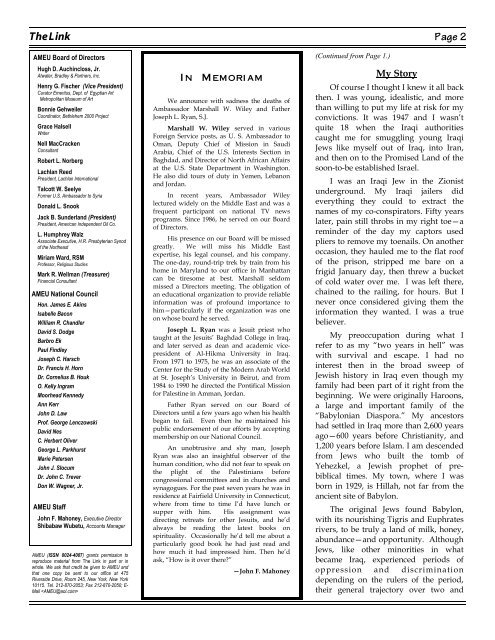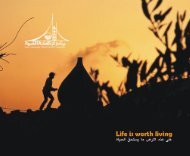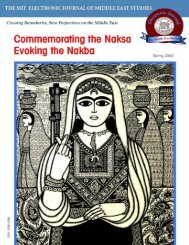The Link - Americans for Middle East Understanding
The Link - Americans for Middle East Understanding
The Link - Americans for Middle East Understanding
Create successful ePaper yourself
Turn your PDF publications into a flip-book with our unique Google optimized e-Paper software.
qÜÉ=iáåâ= m~ÖÉ=O=<br />
AMEU Board of Directors<br />
Hugh D. Auchincloss, Jr.<br />
Atwater, Bradley & Partners, Inc.<br />
Henry G. Fischer (Vice President)<br />
Curator Emeritus, Dept. of Egyptian Art<br />
Metropolitan Museum of Art<br />
Bonnie Gehweiler<br />
Coordinator, Bethlehem 2000 Project<br />
Grace Halsell<br />
Writer<br />
Nell MacCracken<br />
Consultant<br />
Robert L. Norberg<br />
Lachlan Reed<br />
President, Lachlan International<br />
Talcott W. Seelye<br />
Former U.S. Ambassador to Syria<br />
Donald L. Snook<br />
Jack B. Sunderland (President)<br />
President, American Independent Oil Co.<br />
L. Humphrey Walz<br />
Associate Executive, H.R. Presbyterian Synod<br />
of the Northeast<br />
Miriam Ward, RSM<br />
Professor, Religious Studies<br />
Mark R. Wellman (Treasurer)<br />
Financial Consultant<br />
AMEU National Council<br />
Hon. James E. Akins<br />
Isabelle Bacon<br />
William R. Chandler<br />
David S. Dodge<br />
Barbro Ek<br />
Paul Findley<br />
Joseph C. Harsch<br />
Dr. Francis H. Horn<br />
Dr. Cornelius B. Houk<br />
O. Kelly Ingram<br />
Moorhead Kennedy<br />
Ann Kerr<br />
John D. Law<br />
Prof. George Lenczowski<br />
David Nes<br />
C. Herbert Oliver<br />
George L. Parkhurst<br />
Marie Petersen<br />
John J. Slocum<br />
Dr. John C. Trever<br />
Don W. Wagner, Jr.<br />
AMEU Staff<br />
John F. Mahoney, Executive Director<br />
Shibabaw Wubetu, Accounts Manager<br />
AMEU (ISSN 0024-4007) grants permission to<br />
reproduce material from <strong>The</strong> <strong>Link</strong> in part or in<br />
whole. We ask that credit be given to AMEU and<br />
that one copy be sent to our office at 475<br />
Riverside Drive, Room 245, New York, New York<br />
10115. Tel. 212-870-2053; Fax 212-870-2050; E-<br />
Mail <br />
=<br />
f k==jbjlof ^j=<br />
=<br />
We announce with sadness the deaths of<br />
Ambassador Marshall W. Wiley and Father<br />
Joseph L. Ryan, S.J.<br />
Marshall W. Wiley served in various<br />
Foreign Service posts, as U. S. Ambassador to<br />
Oman, Deputy Chief of Mission in Saudi<br />
Arabia, Chief of the U.S. Interests Section in<br />
Baghdad, and Director of North African Affairs<br />
at the U.S. State Department in Washington.<br />
He also did tours of duty in Yemen, Lebanon<br />
and Jordan.<br />
In recent years, Ambassador Wiley<br />
lectured widely on the <strong>Middle</strong> <strong>East</strong> and was a<br />
frequent participant on national TV news<br />
programs. Since 1986, he served on our Board<br />
of Directors.<br />
His presence on our Board will be missed<br />
greatly. We will miss his <strong>Middle</strong> <strong>East</strong><br />
expertise, his legal counsel, and his company.<br />
<strong>The</strong> one-day, round-trip trek by train from his<br />
home in Maryland to our office in Manhattan<br />
can be tiresome at best. Marshall seldom<br />
missed a Directors meeting. <strong>The</strong> obligation of<br />
an educational organization to provide reliable<br />
in<strong>for</strong>mation was of profound importance to<br />
him—particularly if the organization was one<br />
on whose board he served.<br />
Joseph L. Ryan was a Jesuit priest who<br />
taught at the Jesuits’ Baghdad College in Iraq,<br />
and later served as dean and academic vicepresident<br />
of Al-Hikma University in Iraq.<br />
From 1971 to 1975, he was an associate of the<br />
Center <strong>for</strong> the Study of the Modern Arab World<br />
at St. Joseph’s University in Beirut, and from<br />
1984 to 1990 he directed the Pontifical Mission<br />
<strong>for</strong> Palestine in Amman, Jordan.<br />
Father Ryan served on our Board of<br />
Directors until a few years ago when his health<br />
began to fail. Even then he maintained his<br />
public endorsement of our ef<strong>for</strong>ts by accepting<br />
membership on our National Council.<br />
An unobtrusive and shy man, Joseph<br />
Ryan was also an insightful observer of the<br />
human condition, who did not fear to speak on<br />
the plight of the Palestinians be<strong>for</strong>e<br />
congressional committees and in churches and<br />
synagogues. For the past seven years he was in<br />
residence at Fairfield University in Connecticut,<br />
where from time to time I’d have lunch or<br />
supper with him. His assignment was<br />
directing retreats <strong>for</strong> other Jesuits, and he’d<br />
always be reading the latest books on<br />
spirituality. Occasionally he’d tell me about a<br />
particularly good book he had just read and<br />
how much it had impressed him. <strong>The</strong>n he’d<br />
ask, “How is it over there?”<br />
—John F. Mahoney<br />
(Continued from Page 1.)<br />
My Story<br />
Of course I thought I knew it all back<br />
then. I was young, idealistic, and more<br />
than willing to put my life at risk <strong>for</strong> my<br />
convictions. It was 1947 and I wasn’t<br />
quite 18 when the Iraqi authorities<br />
caught me <strong>for</strong> smuggling young Iraqi<br />
Jews like myself out of Iraq, into Iran,<br />
and then on to the Promised Land of the<br />
soon-to-be established Israel.<br />
I was an Iraqi Jew in the Zionist<br />
underground. My Iraqi jailers did<br />
everything they could to extract the<br />
names of my co-conspirators. Fifty years<br />
later, pain still throbs in my right toe—a<br />
reminder of the day my captors used<br />
pliers to remove my toenails. On another<br />
occasion, they hauled me to the flat roof<br />
of the prison, stripped me bare on a<br />
frigid January day, then threw a bucket<br />
of cold water over me. I was left there,<br />
chained to the railing, <strong>for</strong> hours. But I<br />
never once considered giving them the<br />
in<strong>for</strong>mation they wanted. I was a true<br />
believer.<br />
My preoccupation during what I<br />
refer to as my “two years in hell” was<br />
with survival and escape. I had no<br />
interest then in the broad sweep of<br />
Jewish history in Iraq even though my<br />
family had been part of it right from the<br />
beginning. We were originally Haroons,<br />
a large and important family of the<br />
“Babylonian Diaspora.” My ancestors<br />
had settled in Iraq more than 2,600 years<br />
ago—600 years be<strong>for</strong>e Christianity, and<br />
1,200 years be<strong>for</strong>e Islam. I am descended<br />
from Jews who built the tomb of<br />
Yehezkel, a Jewish prophet of prebiblical<br />
times. My town, where I was<br />
born in 1929, is Hillah, not far from the<br />
ancient site of Babylon.<br />
<strong>The</strong> original Jews found Babylon,<br />
with its nourishing Tigris and Euphrates<br />
rivers, to be truly a land of milk, honey,<br />
abundance—and opportunity. Although<br />
Jews, like other minorities in what<br />
became Iraq, experienced periods of<br />
oppression and discrimination<br />
depending on the rulers of the period,<br />
their general trajectory over two and




